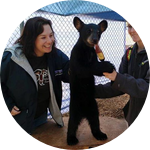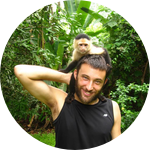About This Project
How prevalent is prosocial behavior in the animal kingdom? What animals assist one another and what are the predictors of such behaviors? In order to explore these questions , we are presenting bats with a test to behave prosaically ie. help a conspecific in need.
Ask the Scientists
Join The DiscussionWhat is the context of this research?
Prosocial behavior was once thought to be unique to humans; However recent evidence has found that prosocial behavior may be more prevalent throughout the animal kingdom than previously thought. There has not been consistent evidence of prosocial evidence in non-human primates. However common vampire bats have been observed to engage in prosocial behavior through the sharing of blood meals. As bats are highly social animals, they make an excellent model with which to study prosocial behavior. We are examining prosocial behavior in Jamaican fruit bats (Artibeus jamaicensis) determine if they also engage in prosocial behavior and what factors such as kinship, dominance, or reciprocity may predict the occurrence of prosocial behavior.
What is the significance of this project?
This research will help shed light on the factors underlining the evolution of prosocial behavior. Even though we know that vampire bats behave prosocially and other bat species engage in behaviors such as pup guarding, we still do not know how prevalent this behavior is in the chiropteran order. Lastly, the knowledge gained from this study examining bat social cognition can be used to improve captive management programs and wildlife rehabilitation programs for bats.
What are the goals of the project?
Our first goal is to determine if Jamaican fruit bats are capable of displaying prosocial behavior just as vampire bats have been observed to do so. If prosocial behavior is observed, our second goal is to determine the factors that best predict the presence of prosocial behavior (kinship, dominance, reciprocity etc.). To accomplish this, we are using an escape paradigm in which a subject bat could opt to release a partner bat from an enclosure to rejoin the social group. The apparatus contains two compartments - one of which is equipped with a sensor that, once triggered, releases the trap door of the adjacent compartment. If subject bats behave prosocially they should continue to release the door on partner present present, but not partner absent trials, over time.
Budget
The bats participating in this study are all captive bats housed at the Organization for Bat Conservation where animal care staff assists researchers by handling all the animals during data collection. As data collection is to continue until the end of February, funds will be needed to pay for the time that the animal care staff is taking to assist with the study.
Endorsed by
Meet the Team
Eric Hoffmaster
I began studying animal cognition at Frostburg State University as an undergraduate. The University was fortunate enough to have a cotton-top tamarin colony where I was able to explore tamarin tool use and temporal reasoning. Upon graduating, I spent time first as an intern and then manager at Alouatta Sanctuary where I was able to focus my research interests to social cognition. As I would spend my days tracking and conducting behavior follows of wild primate troops, I became fascinated with animal social structures and behaviors, wondering what social cognitive abilities they may possess and the evolutionary pressures that may have selected for such abilities. Now I am working on Master's degree as a psychology graduate student at Oakland University where I am fortunate enough to expand my research horizons and move from studying primates to studying bats in order to gain a better understanding of their social cognition.
When I can slip away from school, I enjoy being outdoors and hiking. I grew up close the Appalachian Trail and spent most of my youth hiking local portions of the trail. This helped shape my love for the outdoors, so I try to get out on the trails and also camp whenever I can.
Lab Notes
Nothing posted yet.
Project Backers
- 11Backers
- 31%Funded
- $244Total Donations
- $22.18Average Donation

